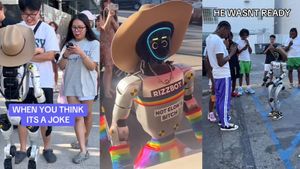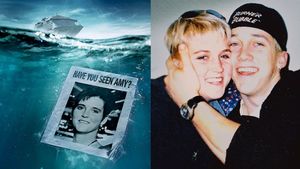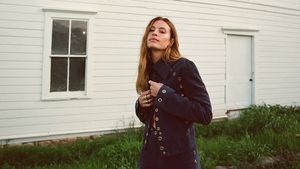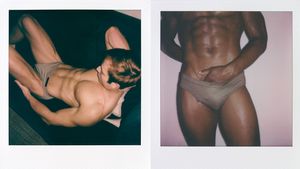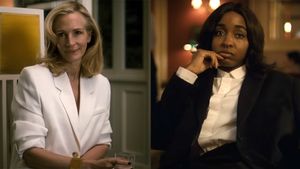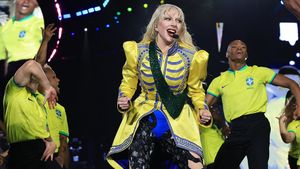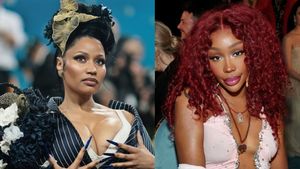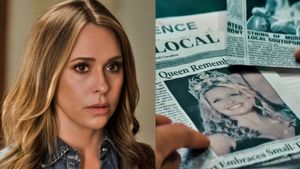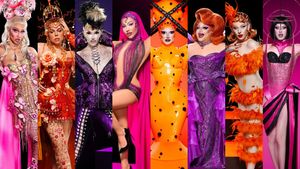CONTACTAbout UsCAREER OPPORTUNITIESADVERTISE WITH USPRIVACY POLICYPRIVACY PREFERENCESTERMS OF USELEGAL NOTICE
© 2025 Equal Entertainment LLC.
All Rights reserved
All Rights reserved
By continuing to use our site, you agree to our Privacy Policy and Terms of Use.
We need your help
Your support makes The Advocate's original LGBTQ+ reporting possible. Become a member today to help us continue this work.
Your support makes The Advocate's original LGBTQ+ reporting possible. Become a member today to help us continue this work.
Strong words from Jeanette Winterson
England's queer literary firebrand speaks out on politics, the backward march of civil rights, and the evil at the heart of her new novel, Lighthousekeeping
England's queer literary firebrand speaks out on politics, the backward march of civil rights, and the evil at the heart of her new novel, Lighthousekeeping
Raised in poverty
under the thumb of a fanatically religious foster
mother, Jeanette Winterson left home at 16 and burst on the
literary scene roughly a decade later with her
acclaimed autobiographical novel, Oranges Are Not
the Only Fruit. Follow-up novels like The
Passion established Winterson as a European-style
fabulist with an international fan base. After a
period of same-sex high adventure that found its way, little
disguised, into her novels of the time, Winterson hit
a "dark period" of bad press and poor
reviews but rebounded in 2003 with an ambitious new Web site
and a popular children's book, The King of
Capri. Now 45 and single, Winterson splits her
time between the 18th-century house she restored in
London's East End (with its natural foods market,
Verde's, on the ground floor) and her 18-acre farm in
Oxfordshire, where she grows her own food.
With her newly published eighth novel,
Lighthousekeeping (Harcourt, $23.00), Winterson
returns to her storytelling roots in religious fanaticism
and fundamentalism. Her protagonist is Silver, a
Scottish orphan who becomes apprentice to a blind man
tending a lighthouse built by the Stevenson family.
Listening to the man's gothic tales, Silver discovers
the dark secrets of the former lighthousekeeper, the
religious fanatic Babel Dark--who inspired
Robert Louis Stevenson to write Dr. Jekyll and Mr. Hyde.
Let's talk about the frightening man at the heart
of your novel--the former lighthousekeeper named
Babel Dark. Of his many unpleasant qualities, you
write about him that he "had trained himself to
think of absolutely nothing." Any comments
relating to contemporary culture?
Babel Dark is the kind of religious obsessive who sees
his own life torn apart because his beliefs are so
inflexible. But in tearing his own life apart he
manages to damage the lives of so many other people: the
woman he loves, his wife, and the people around him in the
village of Salts. The damage you do is never limited
to yourself. So it's a very dangerous position
to occupy, this place of fanaticism and rigid orthodoxy.
So what's the difference between meditating,
emptying oneself of thought in order to rest or for
enlightenment, and becoming empty? And how can you
recognize that?
There's a difference between a willful emptiness
which you force upon yourself because you do not dare
to let in any stray thought and the kind of nirvana
that spiritual leaders teach us to work towards, which is
compassion. The person who is strong in himself never fears
any influences from the outside because he or she
knows that he or she can discriminate against them or
counteract them or simply push them aside.
That's the mark of a strong person. Somebody who can
let it all in, who can walk in the world free and
relaxed, let come what may, and not fear it.
You left home at 16. What would you say to a kid
who has to leave home today at 16, whether by his or her
own choice or because their parents found out
they're gay and kicked them out?
I'd say, leave. I'd say, don't do
drugs, don't do drink, don't end up on
the streets, don't sell your body. It's going
to be incredibly hard. But you can do it--and
it's worth doing it, instead of staying in a place
which will warp your imagination and sap your energy and
twist your desire. You'll have to support
yourself, you're going to have to grow up
quickly. You're going to erect a lot of defenses
which later you'll have to take down again. And
some might not make it, and I know that's not an
acceptable price to pay. But I always value the inner life
above the outer life, and I always value the
imaginative above the material. If you're free
in your mind, you can be free.
And he or she on the street at 16, who should they
turn to?
I had books. That was what saved me. Because when I read
those books I didn't feel like I was a socially
disadvantaged kid with huge problems left to fend for
herself. I thought I was a hero. I thought I was Huck
Finn, I thought I was Aladdin, Crusoe, Heathcliff. I was
able to identify with the strength of the characters
in those books. That's the imaginative life. If
you can identify with something that's entirely a
construct, and that's what art is, then it gives you
enormous strength.
In a recent column you wrote, "What you eat is the
most political thing you do every day." Can you
expand on that?
We can feed the whole world and we can do it
sustainably, or we can have this gross disparity where
so many people in the West are eating twice as much as
they need and they're eating shit and wondering why
they're ruining their own bodies and ruining the
planet and forcing people to work for nothing. And
it's all there, on the food on the plate.
People say, "I have no political power, I have no
choice; I get to vote once every four or five years,
that's it." Not so. Every time you open
your mouth and shove in a forkful of food it is a political
act because either you're supporting a
sustainable system which is fair on the land and fair
on labor or you're supporting a system which is about
exploitation. And think how many times a day we're
allowed to make that choice. And that's power.
You can change the whole thing just by changing your
eating habits.
Why do people feel that art is a luxury, and why
are they in error?
One of the ways of denying or reducing something that
makes you uncomfortable is to say it is a luxury. We
tend to think of art as a peacetime activity or one
for people who have enough money to spare, not for
people who have got troubles in life or who are really
troubled. This is rubbish. Art goes into the places
which are famished, which are not nourished by our
corporate culture, and it begins to nourish those
places. The idea that life has an inside as well as an
outside is so important now. We can't rely on
the church to tell us that. Europeans are good on
this. They can talk philosophically, they're
interested in ideas. Even taxi drivers think of
themselves as intellectual. They'll talk to you
about anything, not just the news but about paintings and
statues they've seen, they've all been
to their galleries. Paris in particular thinks of
itself as a highly intellectual city.
Do you agree?
Yes, I do. Because they're not afraid of culture
there. They put a lot of money into it, a lot of
effort. Philosophers write for newspapers on a regular
basis. They don't marginalize arts and culture. Even
if it's only giving lip service, it's
better than in England or America where people
aren't even paying lip service. Where they see it as
part of the charity division. Or irrelevant. The
Italians and the French don't think that
culture is irrelevant to the important things in life.
Ordinary people will go to the opera, the theater,
coming in off the streets buying cheap tickets alive
with curiosity. In Poland at my readings [in March
2005], we're talking seven, eight, 900 people hungry
for ideas, hungry for culture, not much money to buy
books. So you get three or four people coming in,
saying "We're buying this between us and
we're going to share it." Still wanting
to spend their money like that, still thinking, Well,
you know, we won't go out afterward and buy something
to eat because we can't do both, but
we're going to buy this book. And that's
why I go to these cities, because I feel better there.
People are thinking, talking, arguing.
Do you think you'll move to Paris?
Not full time. I'm trying to get an apartment and
if I succeed, then I'll certainly spend half
the year there.
You love New York though. Nobody could have written
what you've written about this city without being
in love.
Yes.
Have you fallen out of love?
No, I haven't fallen out of love with New York.
It's still a great city, a wonderful city, and
the Americans are still a great people. It's as
though a shadow has fallen over your land. A shadow of fear
and intolerance and oppression. And I hope we see that
shadow disappear. We're all together in this.
Stroh is a writer based in Washington, D.C. She
lives with her family in the Virginia countryside.
Lighthouse-
keeping (Amazon.com)
Oranges Are Not the Only Fruit (Amazon.com)
The Passion (Amazon.com)
The PowerBook (Amazon.com)
The King of Capri (Amazon.com)
Dr. Jeckyll and Mr. Hyde (Amazon.com)
Recommended Stories for You
From our Sponsors
Most Popular
More Videos
0 seconds of 3 minutes, 18 secondsVolume 0%
Press shift question mark to access a list of keyboard shortcuts
Keyboard Shortcuts
Shortcuts Open/Close/ or ?
Play/PauseSPACE
Increase Volume↑
Decrease Volume↓
Seek Forward→
Seek Backward←
Captions On/Offc
Fullscreen/Exit Fullscreenf
Mute/Unmutem
Decrease Caption Size-
Increase Caption Size+ or =
Seek %0-9
Copied
Live
00:00
03:18
03:18
Watch Now: Pride Today
Latest Stories
Trump admin forced to restore $6.2 million to LGBTQ+ and HIV groups
July 17 2025 3:02 PM
Two Wisconsin congressmen clash in front of cameras during U.S. Capitol confrontation
July 17 2025 1:57 PM
True






